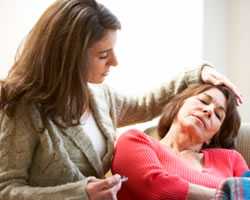Flu Symptoms

If you have cancer now or have had cancer in the past, you are at higher risk for complications from the seasonal flu or influenza, including hospitalization and death. Flu symptoms include fever, cough, sore throat, runny or stuffy nose, body aches, headache, chills, and fatigue. Some people may have vomiting and diarrhea. People may be infected with the flu and have respiratory symptoms without a fever. For more information, visit Flu Symptoms and Complications.
What should cancer patients and survivors do if they think they may have the flu?
If you have received cancer treatment such as chemotherapy and/or radiation therapy within the last month, or have a blood or lymphatic form of cancer, call your doctor immediately if you get flu symptoms. Learn how to prevent infections while you’re receiving chemotherapy.
All cancer patients and survivors should follow the steps below.
- Contact your health care provider and follow his or her instructions.
- Stay home and away from others as much as possible to keep from making them sick. This means you should avoid public activities, including work, school, travel, shopping, social events, and public gatherings. You should stay home for at least 24 hours after your fever is gone (without the use of fever-reducing medicine), except to get medical care or other necessities.
- If you need to go to the doctor’s office, emergency room, or any other health care facility, cover your mouth and nose with a facemask, if available and tolerable, or cover your mouth and nose with a tissue when coughing or sneezing. Let the facility’s staff know you are there because you think you may have the flu.
For more information, visit Flu: What to Do If You Get Sick.
- Page last reviewed: July 30, 2013
- Page last updated: September 26, 2017
- Content source:


 ShareCompartir
ShareCompartir